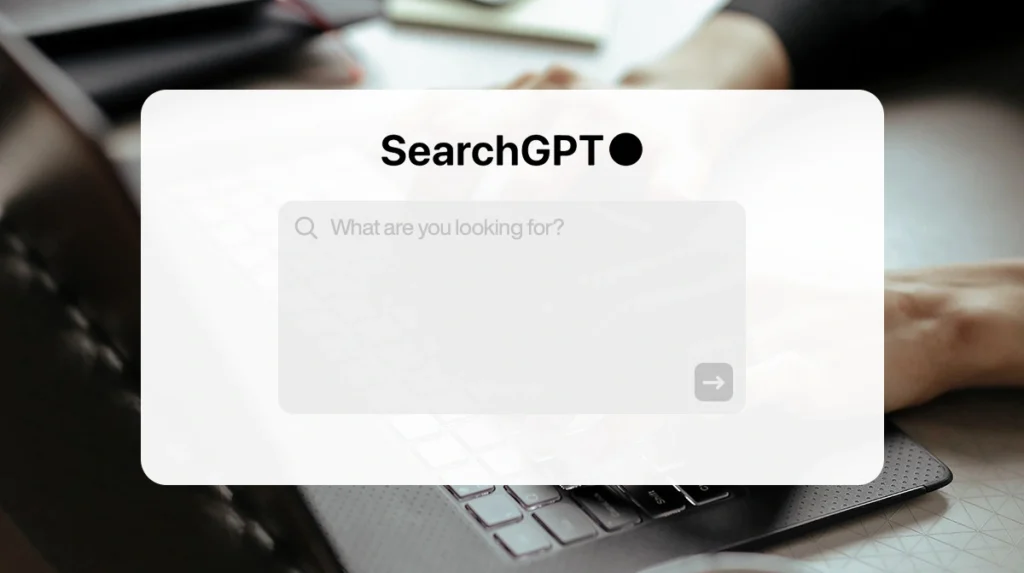Introduction
The concept of organic search isn’t new to business owners! Over the last two decades, Search Engine Optimization (SEO) has driven organic visibility for brands and businesses worldwide.
Nearly 70% of SEO professionals focus on organic rankings and conversions. Wonder why? Organic rankings help build trust, establish authority, and save the budget by exhausting paid campaigns.
Enter SearchGPT: An Innovation for Search
Considering the trends over the last few years, almost every business is fighting to the top of large search engine giants (with Google reigning supreme). Interestingly, however, today, we have a new opportunity with a fresh player in the market, SearchGPT. Unlike traditional search engines, SearchGPT leverages advanced AI to understand and answer user queries with greater insight and understanding.
In this blog, we look closely at SearchGPT and understand more about the latest opportunity.
What is Search GPT? The Opportunity in Detail
SearchGPT is a new AI search engine developed by OpenAI. Unlike traditional search engines that rely on keywords to discover information, SearchGPT understands and processes natural language using powerful artificial intelligence.
This means you may ask questions or enter search phrases just like you would with a person. The AI-powered search engine will understand and discover the most appropriate answers.
It tries to give more accurate and valuable results by determining the context and meaning of your search. This gives you better access to information, whether seeking quick answers, studying a topic, or experimenting with new ideas.
How SearchGPT Works?
SearchGPT uses powerful artificial intelligence to interpret and process natural language.
When you type in a query or search term, it does not just hunt for matching keywords, as typical search engines do. Instead, it interprets the meaning of your words and locates the most relevant content depending on the context.
Ability to Tackle Complex Questions
One distinguishing aspect of SearchGPT is its capacity to interpret complicated inquiries and deliver extensive responses.
For example, if you query, “What are the downsides of drinking excessive tea?” SearchGPT will list the disadvantages and explain why, citing credible sources.
Conversational Ability
Another distinguishing characteristic is its conversational capability. SearchGPT may engage in a discussion with you to help narrow down your search.
If you begin with a general query, such as “How to lose fat faster?” it can ask follow-up questions to identify better the precise information you need, such as exercise routines, nutrition suggestions, or mental wellness strategies.
These characteristics make SearchGPT a potent tool for swiftly locating detailed and relevant information, increasing the efficiency and effectiveness of your internet searches.
Whether conducting research, seeking guidance, or simply interested in a topic, SearchGPT can help you locate the information you need conversationally and naturally.
Now that we have a brief idea of SearchGPT and how it works, let’s examine it closely to see how it compares to leading search engines.
Why SearchGPT? What Sets It Apart
Unlike typical search engines, which depend mostly on keyword matching, SearchGPT employs powerful AI to determine the purpose behind your requests. This enables more natural and conversational exchanges as if you were speaking with a skilled assistant.
- Quick and Timely Answers: SearchGPT wants to save you time by delivering quick answers to your inquiries and clear and relevant references. The idea is to spend less time looking and more time obtaining solutions.
- Real-Time Information: The search engine guarantees access to the most recent facts and advancements by retrieving information from the web.
- Natural, Intuitive Search: SearchGPT allows you to search conversationally, ask follow-up questions, and communicate as if in a chat. This makes the search experience more straightforward and user-friendly.
- Visual Results: SearchGPT delivers visual replies, such as photos and movies, to help you comprehend the information more clearly.
- User Interaction and Feedback: SearchGPT is meant to learn from user comments, constantly improving its performance and relevancy of results.
[ Read More: AI-Driven Personalized Product Recommendation: Use Cases and Benefits ]
SearchGPT Vs. Other Search Engines: A Quick Overview
SearchGPT for Chrome
SearchGPT is a Chrome plugin that combines ChatGPT into your surfing experience. It allows you to communicate with an AI by searching or browsing the web. It integrates the conversational capability of GPT into your browser, allowing you to ask questions and receive thorough replies without leaving the website.
Here’s an overview of the key features of the Chrome extension:
- Conversational Search: Users can ask questions in a natural language format and receive immediate responses.
- On-Page Interaction: You can search or ask follow-up questions without leaving the current webpage.
- Personalized Answers: Tailored responses based on user inputs for more specific and relevant information.
- Summarization: Quick content summaries for articles, webpages, or topics, helping to cut down research time.
- No Navigation Required: Unlike traditional search engines, you don’t need to click multiple links or pages to find the desired information.
SearchGPT allows you to refine your searches by asking follow-up questions immediately within the search engine interface, resulting in more accurate and customized replies. It improves productivity by minimizing the need to trawl through several pages of search results and links, allowing users to concentrate on high-quality, relevant information more quickly.
SearchGPT vs. Perplexity
Perplexity is another AI-powered search tool; however, it works differently from SearchGPT. While both provide AI-driven search results, Perplexity was designed to provide brief, reliable solutions backed up by citations. It prioritizes reliability, with obvious sources for its replies, unlike SearchGPT, which provides more fluid, conversational responses but needs more thorough citation transparency.
Let’s have a look at their key highlights:
SearchGPT Key Points:
- Natural Conversations: Provides answers in a conversational tone, which is great for quick understanding.
- Less Emphasis on Sources: While accurate, it does not always provide precise citations for its answers.
- Interactive: Users can pose follow-up questions and refine searches based on earlier responses.
[ Read More: Chatbots and Their Impact on Customer Support ]
Perplexity Key Points:
- Human-like Reasoning: AI that mimics human thought processes to offer concise, logical answers.
- Cited Sources: Provides verifiable answers with clear citations for easy fact-checking.
- Great for Research: Ideal for users prioritizing trustworthy, reliable information, especially for research-heavy tasks.
While SearchGPT thrives in user experience and engagement, Perplexity excels in dependability and verifiability, allowing users to track the source of information readily. Perplexity is more suited for research-intensive jobs, whereas SearchGPT is best for individuals looking for a quick, intuitive approach to exploring subjects or ideas.
SearchGPT vs. Google
The functionality of SearchGPT stands in stark contrast to that of Google. It arranges information into a list of results that users may scroll through. While SearchGPT uses AI-powered conversational search, Google displays many search results from diverse sources. Google’s algorithm emphasizes broad, diversified sources of information, ranking websites according to relevancy, SEO, and authority.
SearchGPT Key Points:
- Direct Answers: Delivers results directly to the user without browsing through multiple links.
- No Link Clicking Required: Users can get responses instantly without sorting through web pages.
- User-Friendly Interaction: More personalized, with an interactive and intuitive search experience.
Google Key Points:
- Extensive Results: Offers comprehensive lists of websites, documents, and resources for broad research.
- Ranked Results: Uses complex algorithms to prioritize websites based on SEO and relevance.
- Vast Database: Ideal for deep-dive research where users must explore various perspectives or information sources.
[ Also Read: How AI Is Transforming The Online Shopping Experience ]
On the contrary, SearchGPT delivers straight answers rather than requiring users to navigate through connections. Although Google provides more broad material, SearchGPT is faster for finding particular answers without distractions. However, Google’s enormous database is more reliable for conducting in-depth research using extensive sources and data.
Tabular Representation of SearchGPT vs. Perplexity vs. Google
| Feature | SearchGPT | Perplexity | |
| Search Style | Conversational AI-based | AI-generated but concise responses | Traditional search results with links |
| Citations | Limited citation transparency | Sources cited | Extensive, through external links |
| User Interaction | Interactive, dialogue-based | Human-like reasoning | Minimal, result-oriented interaction. |
| Speed | Quick, direct answers | Quick, with reliable answers | Varies based on the query |
| Best Usecase | Personalized searches | Tasks that require extensive research | Broad searches |
Is SearchGPT Out Yet?
SearchGPT has yet to be formally distributed to the public. OpenAI has released the SearchGPT prototype, which was available to be tested by a limited number of users. However, SearchGPT is still in the development or testing stages.
While AI-powered search technologies are evolving, no details on the public release or availability of SearchGPT have been verified.
If you want to leverage SearchGPT or related tools, check OpenAI’s official announcements for the most recent upgrades and information on availability.
What does the emergence of SearchGPT mean for the search Industry?
The development of SearchGPT marks a fundamental shift in the search market. It introduces improved AI-powered search capabilities to interpret natural language and offer more relevant, thorough replies.
Consumers should anticipate a more intuitive and conversational search experience, with questions understood in context and replies customized to their specific requirements.
As SearchGPT and other related technologies evolve, established search engines may need to adjust to stay up. Overall, it represents a shift toward more tailored and efficient methods of accessing information online.
Related Articles
-
The Future of AI Agents: How Intelligent Automation Is Transforming Enterprise Workflows
We’re entering a new era of automation~ smarter, faster, and more human-like than ever. For years, businesses used basic automation to handle repetitive tasks, but those tools couldn’t adapt or
-
Top 12 AI-driven Testing Tools to Explore in 2025
AI-powered testing tools have revolutionized the software testing process by automating and optimizing various stages of quality assurance (QA). These tools utilize artificial intelligence and machine learning to enhance test
-
Top Logo Design Tools to Elevate Your Brand Identity in 2025
Introduction Creating a unique and professional logo is essential for any business or individual looking to build a strong brand identity. A logo is often the first thing people notice,




